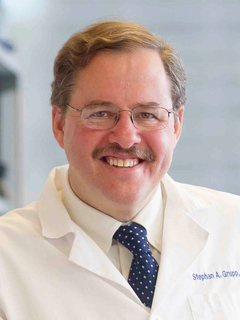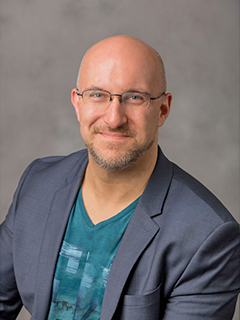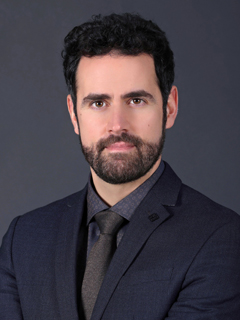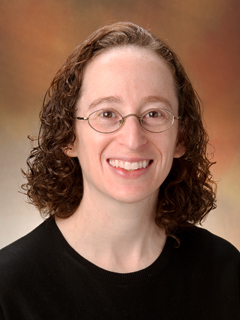HOW CAN WE HELP YOU? Call 1-800-TRY-CHOP
In This Section
CAR T-cell Therapy, Red Ribbon Award, APS Inductees, Neurodevelopmental Disorders

December brings research news highlights of advances in cell and gene therapy, and a new 3D protein structure that could help CAR therapy become more effective. One Children's Hospital of Philadelphia researcher is honored with the University of Pennsylvania's Red Ribbon Award, while five others became members of the American Pediatric Society. And an international team led by CHOP researchers reveals a link between three novel genes and neurodevelopmental disorders.
CHOP Scientists Seek to Make CAR T-cell Therapies More Accessible
Although CAR T-cell therapies can be transformative treatments for children with cancer, as was the case with Emily Whitehead in 2012, the cost of such treatments can be prohibitive. In an interview with WHYY, featured on The Pulse podcast, Stephan Kadauke, MD, PhD, co-director of the Cell and Gene Therapy Lab, and Stephan Grupp, MD, PhD, director of translational research in the Center for Childhood Cancer Research, explained how they are working toward making CAR T-cell therapy less expensive and more accessible for patients.
"Price is one of the issues, but the other thing is that we spent a significant amount of time figuring out how to make this work for us, how to convince the FDA that this is safe," Dr. Kadauke said. "We wrote comprehensive standard operating procedures that have a lot of our know-how and experience baked into them, and we feel that it's a really good thing to not keep that under lock and key for ourselves, but to use this knowledge to improve patient access in other places."
After gaining approval for on-site manufacturing from the Food and Drug Administration, the Cell and Gene Therapy Lab now houses a game changing machine in one of its three clean rooms. The machine combines the raw materials that go into CAR T-cell production, using a computer to complete the task automatically and minimize hands-on time. Combined with the benefit of having a functional stem cell lab at CHOP, cost analyses that include labor and testing suggest that the price of CAR T-cell production can be reduced to $30,000 per patient, a 63% decrease from the initial cost of $475,000 in 2017.
Learn more in this WHYY article.
Discovery of 3D Protein Structure Could Improve CAR Therapy
Students from the University of Pennsylvania worked with scientists in the Mechanistic Molecular Immunology Lab, led by Nikolaos Sgourakis, PhD, to reveal a three-dimensional protein structure that explains how peptide-centric chimeric antigen receptors, or PC-CARS, can recognize the "backbone" of human leukocyte antigens (HLAs) to deliver targeted therapies to kill cancerous tumor cells. The study was published in Science Immunology.
"If CARs are not matched properly to target the specific alleles associated with certain cancers, there is a risk of inducing toxicity without providing any therapeutic benefit," said senior author Dr. Sgourakis, associate professor in the Center for Computational and Genomic Medicine at CHOP. "By looking at their 3D complex structures, we can use these findings to design CARs that are able to target multiple HLAs and increase the efficiency of therapeutic design."
The challenge the team faced is that HLAs are derived from genes with more than 25,000 varied alleles, stretches of DNA that code proteins to carry out essential functions, which make it difficult to design PC-CARs that target the specific alleles associated with different cancers. The protein structure allowed researchers to use a combination of biochemical binding assays, molecular dynamics simulations, and structural and functional analyses to determine that certain classes of HLAs are cross-reactive, or that the different antigens' "backbones" can be similarly recognized by PC-CAR therapy.
Learn more in this CHOP news release.
Penn Honors Outstanding Researcher with Red Ribbon Award
Congratulations to Elizabeth Lowenthal, MD, MSCE, who received the Red Ribbon Award for Outstanding Researcher from the Penn Center for AIDS Research (CFAR) Community Advisory Board. In recognition of World AIDS Day Dec. 1, the Center recognized the efforts of local heroes in policy, research, community, faith, and youth leadership who are making a difference in the fight against HIV/AIDS.
With the goal of improving the health of children in resource-limited areas, Dr. Lowenthal's research focuses on the measurement of cognitive function in HIV-affected children and adolescents in Botswana. As the director of the Global Health Research Affinity Group, she serves as the principal investigator for two philanthropically funded trials based in the Dominican Republic that evaluate a novel strategy to address iron-deficiency anemia in infants and young children. Her work has been influential to changing and updating HIV treatment guidelines in both the United States and internationally.
The award ceremony provided the opportunity for people worldwide to unite in the fight against HIV, to show support for people living with HIV, and to commemorate those who have died from an AIDS-related illness.
Learn more in the Penn CFAR Red Ribbon announcement.
Three Novel Genes Linked to Neurodevelopmental Disorders
Approximately one-third of patients with neurodevelopmental disorders receive a genetic diagnosis, however little is known about how the malfunction of different signaling pathways leads to these disorders. An international team of researchers led by CHOP scientists addressed this gap by exploring malfunctions in gene splicing, revealing a connection between three specific genes and developmental delay, intellectual disability, and autism.
Through phenotyping, genomic sequencing, and modeling in fly and stem cells, researchers analyzed genomic and clinical data from unrelated patients with neurodevelopmental disorders. Forty-six patients had missense variants of the gene U2AF2, and six patients had variants of the gene PRPF19, that, when compared to human stem cell and fly models, created similar issues with the formation of neurites, as well as with splicing and social deficits in the fly models. Deeper profiling revealed a third gene, RBFOX1, had mutations that affected splicing and loss of proper neuron function, confirming all three genes can lead to neurodevelopmental disorders.
"Not only does this study identify three causative genes associated with neurodevelopmental disorders, but it helps us understand how critical pre-mRNA splicing is to the development of the central nervous system," said senior study author Hakon Hakonarson, MD, PhD, director of the Center for Applied Genomics at CHOP.
Read more about the study, published in The Journal of Clinical Investigation, in this CHOP news release.
American Pediatric Society Selects Five New Members from CHOP
The American Pediatric Society (APS) announced 84 new members for 2024, five of whom represent CHOP. Members of APS are recognized child health leaders of extraordinary achievement who work together to shape the future of academic pediatrics. Current members nominate new members by recognizing individuals who have distinguished themselves as child health leaders, teachers, scholars, policymakers, and clinicians. Meet the new members below:
Fran Balamuth, MD, PhD, MSCE, is director of research in the Division of Emergency Medicine, and co-leader of the CHOP Pediatric Sepsis Program. Her research focuses on pediatric sepsis recognition using both epidemiologic and translational approaches, and promotes local clinical, research, educational, and quality improvement initiatives around sepsis.
Director of Research on Pediatric Education, Dorene Balmer, PhD, studies learning as a social activity in the context of medicine. Through qualitative research in medical education, Dr. Balmer explores the development of physicians' professional identities.
Angela Ellison, MD, MSc, the Louis Starr endowed vice chair of the Department of Pediatrics at CHOP, works to improve the outcomes of hematologic emergencies like sickle cell disease and thrombosis while advancing health equity. She is a nationally recognized leader in pediatric emergency medicine, serving as the co-chair of the Pediatric Emergency Medicine Special Interest Group for the Academic Pediatric Association.
Sharon McGrath-Morrow, MD, MBA, is the associate division chief of the Division of Pulmonary and Sleep Medicine and leader of the Post-preemie Lung Disease Clinic. Studying the effects of neonatal lung injuries and infections on lung immune responses, alveolar growth, and adult pulmonary outcomes, her research links early life events with adult lung health and biomarker discovery for future trials.
Cystic Fibrosis Center Director, Clement Ren, MD, MBA, seeks to develop better methods to assess lung disease in infants and young children using advanced pulmonary function testing and imaging. He also explores cystic fibrosis epidemiology by studying outcomes using the cystic fibrosis patient registry, especially for infant and newborn screenings.
Congratulations to all!
Read this APS press release to learn more.
ICYMI
Catch up on our headlines from our Nov. 24 In the News:
- CHOP Researchers Showcase Work at American Heart Association Meeting
- CHOP Scientist Receives Prestigious Sontag Award to Advance Brain Cancer Research
- CHOP Researchers Report Racial Disparities in Preterm Birth in Philadelphia
- Tami Benton, MD, Welcomed as President of American Academy of Child and Adolescent Psychiatry
- Riccardo Gottardi, PhD, Receives Biomedical Engineering Society Award
Keep up with our news, stories, and updates in real time by following us on X, Facebook, LinkedIn, or Instagram. Meet the minds behind the science in the Bench to Bedside podcast. Or subscribe to our newsletter to receive an email every other Friday by signing up here.







